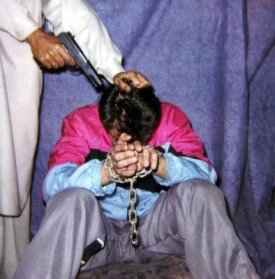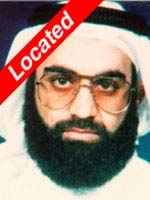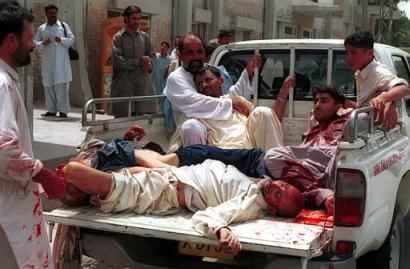|
Lashkar-e-Jhangvi There's a commonly held belief that Wall Street Journal reporter Daniel Pearl was killed by al Qaeda, and that's more or less true.
There's a commonly held belief that Wall Street Journal reporter Daniel Pearl was killed by al Qaeda, and that's more or less true. But it's also correct to say he was killed by Lashkar-e-Jhangvi, a Pakistani terrorist group. Not to mention the fact that it will give you instant and overwhelming dominance in dinner-party battles over current events savvy. Lashkar-e-Jhangvi, very roughly pronounced "LAH-SH-kah EYE ZHAH-ng-vee," is an ultraviolent group of Pakistani Islamic fundamentalists. LeJ was founded by a cabal which included Muhammad Ajmal and Haq Nawaz Jhangvi in 1996, because he thought that Pakistan's ultraviolent Sipah-e-Sahaba Pakistan wasn't ultraviolent enough. SSP (whose name roughly translates as "Guardians of the Friends of the Prophet") was a Saudi-funded terror group whose membership reputedly included Ramzi Yousef and Abu Musab al-Zarqawi. In 1994 and 1995, Yousef attempted to assassinate Pakistani Prime Minister Benazir Bhutto, quite possibly on behalf of the SSP, whose stated goal is to transform Pakistan into a Sunni Muslim state under the rule of sha'ria law. SSP and LeJ are Wahabbi-influenced Muslims who follow an obscure school of theology called Deobandi Islam. According to Deobandi Islam, the main problem afflicting the Muslim world is the corrupt and immoral Western influence, which therefore must be eradicated at all costs. Deobandi Muslims have more in common with the Taliban than the Saudis, however, and the Taliban's Dar-ul-Uloom University was a Deoband institution. After Yousef's arrest, SSP fractured into two groups, the violent one (which kept the name SSP) and the even more violent one, which took the name Lashkar-e-Jhangvi, which means "Army of Jhangvi." (Jhangvi himself was assassinated in 1990.)
Lashkar-e-Jhangvi has ties to al Qaeda. Although the depth and breadth of those ties are unclear, a few solid facts tend to suggest the ties are close and deep. LeJ maintains a strong presence in Balochistan, the mostly lawless Pakistani province from whence hails Yousef, Badini and Yousef's uncle, Khalid Shaikh Mohammed. At the very least, KSM (al Qaeda's No. 3 commander at the time) enjoyed spending time with LeJ operatives while in Pakistan. Far more likely, he was giving them orders. In January 2002, well after the War on Terror was underway, Wall Street Journal reporter Daniel Pearl hit the streets of Karachi, working on an investigative story about Khalid, who was at the time the third-most wanted terrorist in the world with a $25 million bounty on his head. Pearl was lured into a trap, kidnapped and imprisoned. It's now believed that LeJ militants were responsible for this phase of the operation, including four who were arrested and convicted (three received life sentences). Two more LeJ operatives were secretly held in Karachi after the killing, and later accused of abetting the crime, which they said was committed by three unknown Arabs. By early 2003, at least one of the Arabs was known, and his name was Khalid Shaikh Mohammed. Overall, that adds up to an awful lot of organizational support from Lashkar-e-Jhangvi. Not to mention a high casualty count. Up to seven LeJ operatives are doing time for the murder. In a group that probably numbers less than 100, that's not small change.
While Lashkar-e-Jhangvi obviously takes some direction from al Qaeda, the group stays admirably focused on its home turf and its stated goal of radicalizing Pakistan. The stakes in that battle are far from parochial. In addition to its nuclear arsenal (yoiks!), Pakistan is a key strategic ally of the U.S. in its War on Terror (even though the Pakistani government has historically been one of the world's worst offenders as far as harboring and supporting terrorism). To accomplish its goals, LeJ has embarked on a campaign to foment revolution and eliminate its perceived rivals, which include especially Pakistan's significant Shi'a Muslim population. The group killed 25 Shi'a Muslims in 1998 and attempted to assassinate Prime Minister Nawaz Sharif in 1999. Among other things, LeJ is blamed for car bombings against U.S. interests, murdering U.S. oil workers and drive-by shootings of police cadets. In a videotape message made recently, LeJ claimed responsibility for a 2003 suicide attack against a Quetta mosque which killed 50 Shi'a. Pakistan's 151 million people are 97 percent Muslim. About 70 percent are Sunnis (including Lashkar-e-Jhangvi adherents) and about 20 percent (30 million people) are Shi'a. As you can see, there are still a lot of Shi'a to be killed. For a group with fewer that 100 members, divided into cells of five to 15 operatives, LeJ has a disproportionately high impact, mostly because of its effectiveness. It's not an accident that Ramzi Yousef's uncle and brother-in-law are members. LeJ members are hardened operatives, most of whom trained in Afghanistan. They're the most highly trained and vicious killers the world of terrorism has to offer. And LeJ's goal is relatively modest—to overthrow an already unstable regime and make a country that's already 70% Sunni Muslim into a Sunni theocracy. The depressing truth is that they probably have a good shot at it.
|
 Authorities say that members of Lashkar-e-Jhangvi include Yousef's brother-in-law Daud Badini. Zarqawi is also thought to maintain links to the group.
Authorities say that members of Lashkar-e-Jhangvi include Yousef's brother-in-law Daud Badini. Zarqawi is also thought to maintain links to the group.  About the only person who isn't doing time for the murder is the actual murderer, KSM, who is rotting away in an "undisclosed location" receiving much the same treatment as the prisoners at
About the only person who isn't doing time for the murder is the actual murderer, KSM, who is rotting away in an "undisclosed location" receiving much the same treatment as the prisoners at